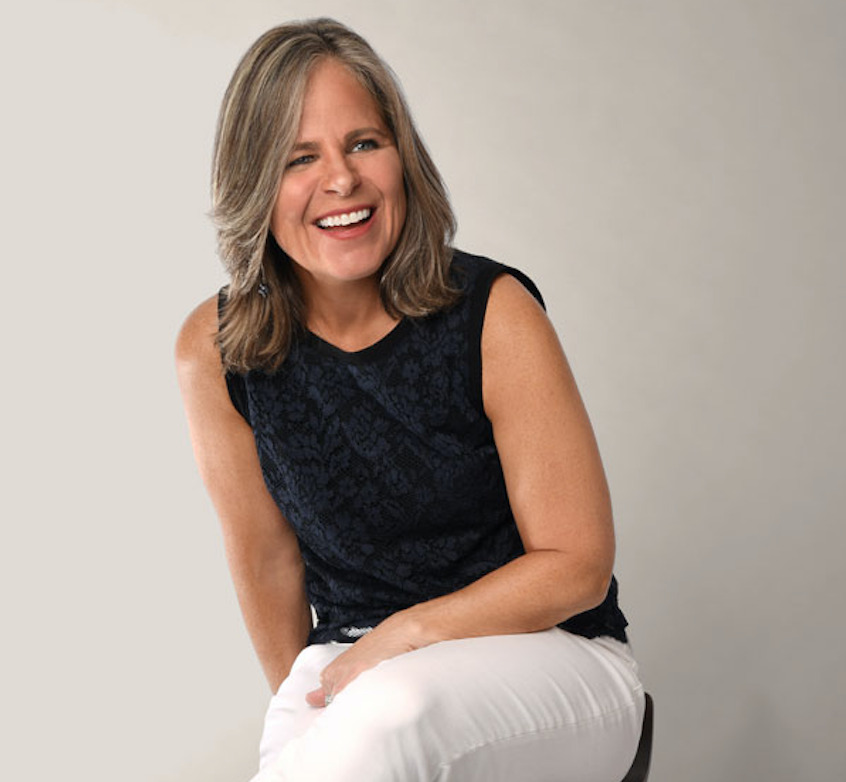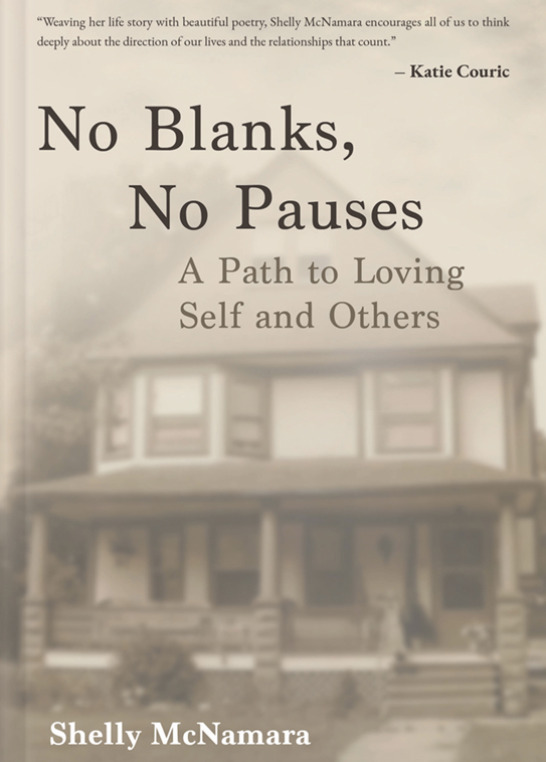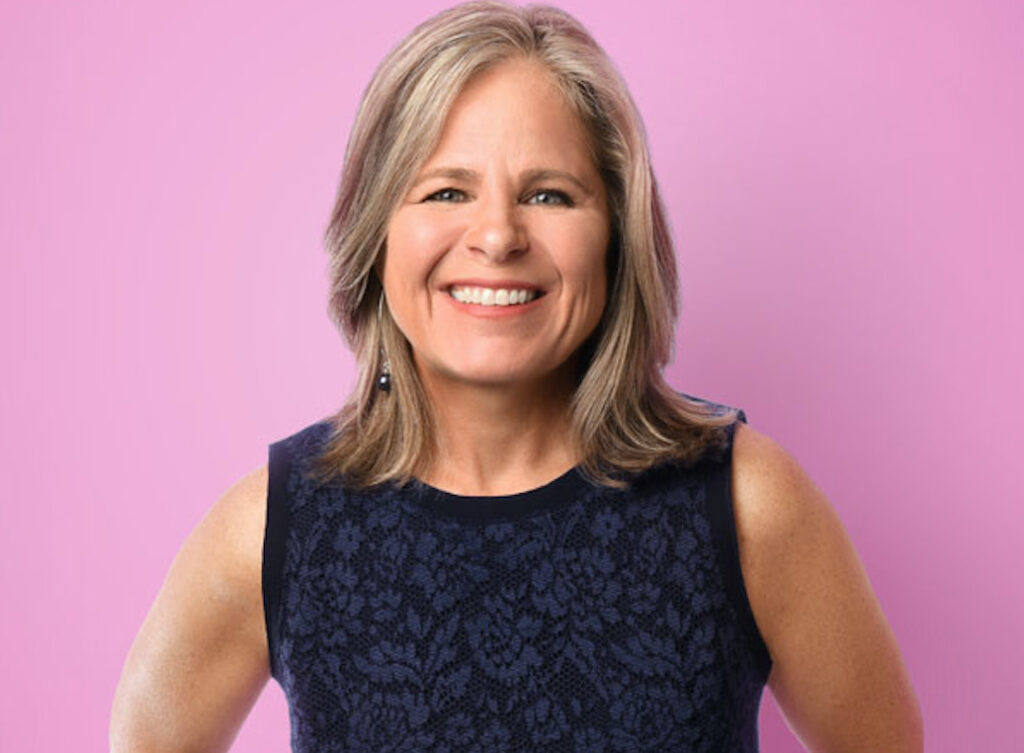Out executive Shelly McNamara advocates for inclusion
As the Chief Equality & Inclusion Officer at Procter & Gamble, one of the world’s most admired companies, Shelly works to make P&G one of the most innovative, diverse, and inclusive companies in the world.
Well-known for her speeches that are compassionate, courageous, and authentic, Shelly uses her powerful insights to elevate the consciousness and connection of people from around the globe. Now, for the first time, Shelly is bringing her stories to us all. Writing helped her embrace her own identity while she waited for the world to recognize her lifelong commitment to the woman she loves and the family they built together. No Blanks, No Pauses: A Path to Loving Self and Others is an exploration of one woman’s journey to live a full and authentic life that holds lessons for each of us. Shelly has written her way through adversity and heartbreak to discover that dreams are worth pursuing, injustice is worth challenging, and peace and fairness are what matter most. Here is a chat with Shelly about the book.
What inspired you to write No Blanks, No Pauses?
My writing began as a way to process pain, my own personal pain. When I was sixteen, a close family friend passed away in a tragic accident. I have a very loving family, but we preferred laughter over pain, so I didn’t have the resources or capability to process my grief. Writing became an outlet for me. As I grew older, I began to write about the pain, joy, and sadness of others, as well. I listened for insights. I built empathy by hearing peoples’ stories of love, loss, regret, rejection, and healing. I loved learning about other’s lives. Woven together, I believe my poetry and stories capture the challenges and beauty of humanity and tell a complete story. I wrote this book because I believe that my journey and the insights I gained along that journey will help others. Writing it was a way to heal from my own wounds, and in reading it, I hope that others are encouraged to heal from theirs. This book is meant for those who have felt deep pain and have been made to feel “less than” because of who they are. My goal is to encourage forgiveness, healing, and connection. We need to make personal and systemic changes that bring about more respect, compassion, and equality for all human beings. We have a lot of work to do as a community and world.

What was your writing process like? You write poetry too—how has this process differed from your other writing?
I am triggered to write when I feel something deeply. My poetry has always been spontaneous. I see. I experience. I feel. I write. I rarely edit the poetry I write. Rarely. About ten years ago, I began building my poetry into speeches I gave for a range of audiences. The poems became the cornerstone of my message and pushed me to be more vulnerable and personal than I would have been without them. I believe this helped me connect more authentically with each audience and offered memorable language—people began repeating lines from my poetry to me. I realized this approach was making a difference for people and eventually compelled me to publish my writing. Looking carefully through my poems (I have written over two hundred of them through the
years), I began to spot patterns in my writing that connected to particular human insights—building walls based on beliefs and biases, living along the edge, the power of level setting the way we see others, becoming better when we come together, and most of all, choosing love. These themes led me to write stories that illuminated each insight and provided the context for the poetry. My poems were often inspired by an event, observation, or experience. In developing this
book, I wrote the stories to frame the poems, deepen the insights, and share the lessons.
As a human resources executive at P&G, and now as P&G’s Chief Equality & Inclusion Officer, you have dedicated your career to putting humans first. How has this unique perspective affected your storytelling?
I work at a company that has operations in more than seventy countries, serves billions of people around the world, and strives to reflect the diversity of the world around us. I have traveled to more than twenty-five countries. I have friends and colleagues across the globe. I have learned from and with a diverse range of humanity. I have built relationships of trust across geographic, cultural, and spiritual divides. It is through these relationships that I learned how deeply connected we all are. We are connected in our shared humanity, our linked economies, our global health, and our desire to live peaceful, joyful lives. I learned that we are different in ways that make each of us unique and magical in our own way. Listening and learning from each other accelerates our growth. I have learned that we must care for and about each other, and the planet we inhabit.
Before becoming a successful executive, you came from humble beginnings. The youngest of 15 children, you were raised by a single mother in a happy home. You went on to pursue academic excellence, and later, came out as gay. How has this inspired you to write about human connection and divides?
Being the youngest of fifteen children is incredible. I was born on the west side of Cleveland, Ohio, in the city of Lakewood. My mother raised us alone from the time I was four years old. I saw and experienced much that I’m sure was great preparation for a career in Human Resources. Our home was a bit like a train station; there were people moving in many different directions all at once. Though my home was chaotic, it also provided a wide range of options for launching my career. Most important for me was that I had a great role model. My mother worked as a nurse on the 3:00-11:00 p.m. shift. She managed to raise all of her children into responsible, loving adults. Despite her meager budget and multiple commitments, she cared deeply for other human beings — both in her professional life as a nurse and in our home as a loving mother. She taught me to have great compassion for others. She saw me for who I was and nurtured that. She would say, “Shelly, you are so very sensitive.” She noticed my interest in others and the circumstances that affected them. She knew that I felt deeply, that I cared deeply, and that I hurt easily. She saw my desire to make a meaningful difference in some way. My mother believed in me, so I believed in myself. I pursued work that came from my core. I observed and internalized the pain, joy, and curiosity that come with humanity. I learned to get along with a broad range of personalities and people in my home. As the youngest, I likely saw and heard things well beyond my years. We had many people, and little money. So I had to grow up fast. I observed my siblings—the decisions they made and the ensuing consequences. I had many models to choose from and paths to pursue. I had a deep desire to find a path with meaning and purpose. That said, it hasn’t been an easy journey for me. In fact, living authentically didn’t come easily for me. I pursued academic excellence to gain independence, affirmation, and unconditional support. I was never perfect, but I pursued perfection relentlessly. Being gay wasn’t a part of my plan. It didn’t fit with my desire to be “the good girl.” The images I saw and the judgment I heard from friends, family, and religion told me that being gay was “less than.” I struggled for years to reconcile who I was with the expectations around me. Eventually, I came to terms with that aspect of my identity because I met and fell in love with my wife, Cindy. Collectively, these experiences were a great learning lab for humanity.

What does the phrase “No Blanks, No Pauses” mean to you?
“No Blanks, No Pauses” is about our human desire to be:
• Seen for who we truly are
• Acknowledged for who we are
• Respected and loved for who we are
These four words—“No Blanks, No Pauses”—originate from pain I know all too well. The pain I have and hold that comes from the moments when I experienced the “blank” and the “pause.” The times I introduced my wife or our three daughters and saw the blank look in return. Or the times I have paused. It’s amazing how much pain can be created by empty space. At times, the empty space eroded my self-confidence and sense of belonging, distanced me from others, and triggered feelings of shame. When I truly experienced “No Blanks, No Pauses” for the first time, I felt free and loved, allowing shame and pain to disappear.
The pursuit of fairness and equality for all is worth it. Open your heart and mind—you will build connections that can heal you and the world. My commitment to equality is deep; the work in front of us is urgent. Above all, I want to instill hope in people that they’ll not just be welcomed, but respected and celebrated, for who they are. Isn’t that what everyone wants?
No Blanks, No Pauses is out on February 2, 2020. For more information go here.






